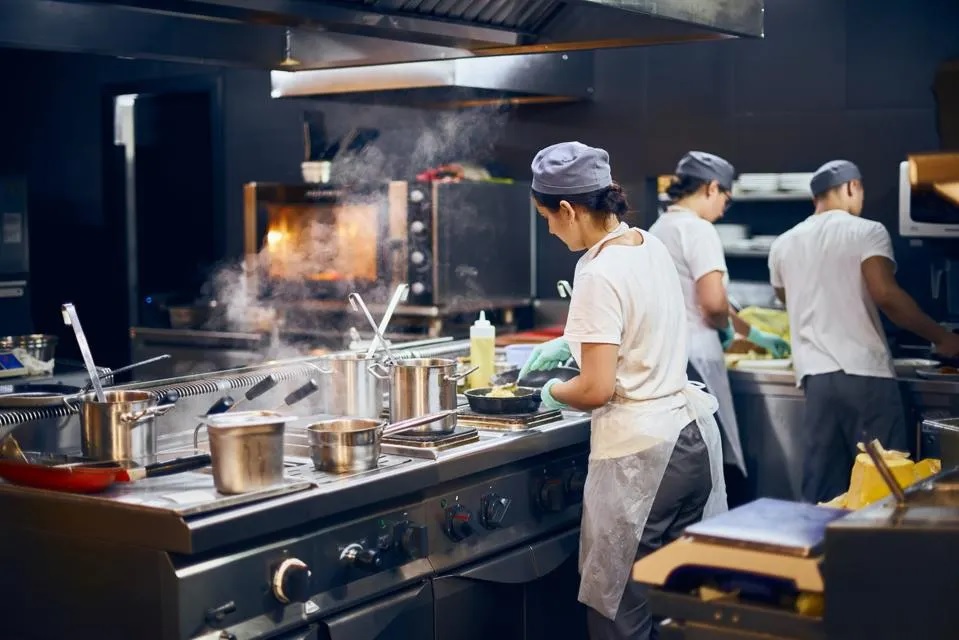The food delivery landscape in the United Arab Emirates has seen a massive transformation over the past couple of years with the rise of UAE Dark Kitchens/Ghost Kitchens/Cloud Kitchens. These virtual kitchen concepts without dine-in options are rapidly multiplying across the country to cater to the growing demand for online food ordering and delivery. In this article, we explore the various models of virtual kitchens and how they are changing consumer food habits and the operations of restaurants in the UAE.
What are dark kitchens, ghost kitchens and cloud kitchens?
The basic concept behind all these virtual kitchen models is the same – having a professional cooking space exclusively for preparing food for delivery and takeaway orders without any seating for dining in. However, there are some key differences:
Dark kitchens: Also referred as shared or communal kitchens, dark kitchens are industrial-style facilities that offer rental space and logistics support for multiple restaurant brands to run delivery-only operations under one roof. This allows restaurants to save on expensive real estate costs and focus only on cuisine preparation and delivery fulfillment.
Ghost kitchens: Operated by food companies or third-party providers, ghost kitchens are similar to dark kitchens but they don’t host multiple restaurant brands. Instead, they develop their own delivery-only food brands and menu specially designed for online ordering. Some popular ghost kitchen operators in the UAE include Kitchen United and Reef Kitchen.
Cloud kitchens: The model is quite similar to ghost kitchens but cloud kitchens make use of centralised kitchen infrastructure and technology platform to manage delivery logistics and orders for various virtual restaurants under one umbrella brand. For example, companies like Kitopi and HOUSE OF POD operate multiple delivery-only brands through their cloud kitchen facilities.
Virtual restaurants and the future of dining
With the Covid-19 pandemic increasing demand for contactless food delivery, these virtual kitchen models saw rapid growth in the UAE over the past two years. Popular mall-based restaurants and cafe chains who faced losses during lockdowns set up their own dark kitchen facilities to stay operational.
International players also introduced new ghost kitchen concepts and delivery-only brands specially designed for online ordering. As per recent research reports, the number of dark kitchens in Dubai alone grew over 300% from 2020 to 2022, with more in the pipeline. These facilities are powering hundreds of virtual restaurant brands that only exist online.
While some experts debate if virtual restaurants can replace the dine-in experience, it is evident they are revolutionizing how people access and enjoy restaurant foods. The experience of dining out and at home is likely to change as virtual restaurants expand their menus, delivery areas and capabilities through new technologies. Many restaurants are also exploring hybrid models combining digital food brands with their regular operations.
Challenges and opportunities for UAE’s F&B sector
The growing prominence of dark kitchens does pose challenges for the traditional dine-in restaurant model. Factors like high realty rents, increasing resources needed to maintain physical spaces and competitive delivery business are putting pressure on many standalone restaurants. On the other hand, virtual kitchens also offer new opportunities:
Access To A Wider Customer Base: By leveraging deliveryaggregator fleets and online discoverability, dark kitchen brands can tap new residential areas and customer segments to expand their business beyond physical location constraints.
Cost Efficiencies: Virtual restaurants don’t have to spend on expensive settings, wait staff etc. This allows them to offer lower meal prices while still being profitable through high order volumes. They can also better optimize menu and storage space.
Testing New Concepts: Dark kitchens give restaurants a low-cost way to test new cuisines and brands for delivery before investing in full-fledged physical outlets. This reduces risks and helps prioritize popular menu items.
With growing maturity and competition, regulatory support will also be crucial for the F&B sector in UAE to smoothly transition through these changes. Measures to streamline licensing, ensure fair cloud kitchen policies and support traditional outlets would be important to balance opportunities and risks as the industry evolves rapidly.
Market Maturity And Future Outlook
After initial surge, the UAE’s dark kitchen industry is now entering more mature phases of consolidation and standardization. Major players are expanding their national presence, improving technology back-ends and launching new ventures. Some popular brands are also testing hybrid virtual-dine in models with trial outlets adding limited seating and pickup counters.
Overall, Meanwhile delivery services like Deliveroo, Talabat and UberEats are increasingly partnering cloud kitchen providers for food fulfillment. Integrations with smart logistics, autonomous vehicles and augmented reality are also being explored. Overall, virtual restaurants are likely to grow as a significant segment of UAE’s diversifying F&B landscape in coming years by offering value, flexibility and access to customers. Their impact on consumer food habits and industry job roles would be areas to keenly observe as well., while the road ahead may not be clear in every aspect, it is evident that UAE’s food delivery sector will keep evolving rapidly on the back of virtual kitchen innovations like dark kitchens, ghost kitchens and cloud kitchens. Both new players and traditional restaurants will need to skillfully adapt to changing market environment and consumer preferences that these digital transformations are bringing about.
*Note:
- Source: CoherentMI, Public sources, Desk research
- We have leveraged AI tools to mine information and compile it

